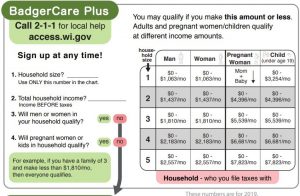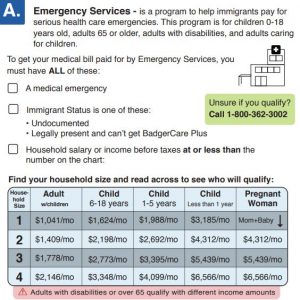Purpose
We want immigrant dairy workers to learn about the importance of signing up their children in health care programs and to understand that health coverage can help their children lead healthier and stronger lives.
If you are not eligible for health care programs (Medicaid or Marketplace) but your children are, you can apply for them! You do not need to provide information about your immigration status or social security number. The only way to know if you or your children are eligible for health coverage is by applying!
Health Insurance Programs
In this article we will focus on health coverage provided by Medicaid and Marketplace. Eligibility for Medicaid and MarketPlace is based upon immigration status and income. Medicaid regards a person eligible if that person is a U.S citizen or a qualifying immigrant. Marketplace regards a person eligible if that person is a U.S. citizen or national (or be lawfully present). More details about eligibility are coming right up. In our next article we will focus on how to apply for Medicaid and Marketplace.
Medicaid Public Benefit Programs for Qualifying Immigrants
There are two programs offered by Medicaid—BadgerCare Plus and Medicaid for the elderly, blind or disabled. BadgerCare Plus is a health insurance program for low-income men, women, pregnant women, and children in Wisconsin. Medicaid for the elderly, blind or disabled is a health insurance program for low-income people who are 65 or older, blind, or disabled. In this article we will focus on BadgerCare Plus because this is the program you need to sign up your children to get them health coverage.
BadgerCare Plus Eligibility—Immigration Status
Medicaid programs do not refer to Emergency services or Prenatal services programs. This is an important distinction because people who are undocumented could be eligible for emergency services or prenatal programs but not for Medicaid programs.
Medicaid programs eligibility based upon immigration status refer to BadgerCare Plus and Medicaid for the elderly, blind or disabled. A list of eligible immigrant status a “U.S. citizen or qualifying immigrants” that includes the most common statuses that qualify under Medicaid are:
- U.S. citizen (children, pregnant women, and adults)
- Refugees and asylees (children, pregnant women, and adults)
- Permanent residents (children, pregnant women, and adults who have been permanent residents for 5 years)
- Some visa types, such as for victims of domestic abuse or human trafficking
BadgerCare Plus Eligibility—Income
Based on someone household size what they might be eligible for are based on their income. In this table you can see eligibility based on household size and income. In here household is defined as who you file taxes with. You read this table as follows: if you have a family of 3 and make less than $1,810/month, then everyone qualifies for BadgerCare Plus. The entire factsheet is found here: Health Insurance Options for you and your Family or at the end of this article.
BadgerCare Plus for Children
Children born in the U.S. can be eligible for BadgerCare Plus, even if their parents are not eligible. Children who are “qualifying immigrants” aged 18 and younger, do not have a 5-year waiting period. We want to emphasize the importance of enrolling your children in BadgerCare Plus if they are eligible because children have been disenrolled from BadgerCare Plus because parents are concern that this might impact their immigration status or increase the risk that a family member might be deported. Children’s enrollment in BadgerCare Plus or any public benefit program will not negatively impact their parents’ immigration status. For more information about the public charge rule go to coveringwi.org/immigration or look at our article here: Facts About Immigration and Public Benefits for Immigrant Dairy Workers, Public Charge Rule
Marketplace Eligibility—Immigration Status
Marketplace financial assistance or tax credits are not a public benefit, so it is not considered when looking at public charge rule.
The Marketplace defines an eligible immigrant status as, “a U.S. citizen or national (or be lawfully present)” This means that Marketplace coverage accepts almost all statuses except for immigrants who are undocumented, and people who qualify under the Deferred Action for Childhood Arrivals (DACA) program. Then, if you can verify a status, the person most likely has an eligible immigration status
Marketplace Eligibility—Income
Marketplace tax credit eligibility in terms of income are for people between 100% and 400% of the federal poverty level and that is based on household size. This eligibility is true for people who qualify for Marketplace coverage and for people in the 5-year wait period (not eligible for Medicaid programs).
Low-Income Immigrants in 5 Year Wait Period
Immigrants in that 5-year waiting period do not qualify for Medicaid programs but they can qualify for Marketplace coverage. They will qualify for Marketplace with a tax credit even if they are below 100% of the federal poverty level. If you do have an eligible immigration status, you most likely have an option for health insurance.
Programs for Immigrants Not Eligible for Medicaid
For immigrant population who do not qualify for traditional Medicaid programs (BadgerCare Plus and Medicaid for the elderly, blind or disabled) due to immigration status (ie: undocumented or have not lived here 5 years), they may qualify for the following two programs:
For women who otherwise would be income eligible for Medicaid who are pregnant, they may qualify for BadgerCare Plus Prenatal even if their status bars them from the Medicaid program and this is a very useful program because it covers all of the pregnancy related costs.
Emergency services are for immigrants who also do not qualify for Medicaid but otherwise would if they had an eligible immigrant status. This program is used for people in that 5-year wait period or undocumented immigrants. This program is for children 0-18 years old, adults 65 or older, adults with disabilities, adults caring for children at home, and pregnant women.
Medical emergency is defined as risk of losing life or limb. There is an income level eligibility for this program as well. Talk with your health provider to assess your eligibility for this emergency program or call 1-800-362-3002 if you are unsure if you qualify. You do not need a social security number (SSN) to apply and your information will not be shared with INS (Immigration services) or ICE (Immigration and Customs Enforcement).
Options for Undocumented Immigrants
For more information about medical assistance options you can go to https://farms.extension.wisc.edu/coronavirus/#safe or https://www.coveringwi.org/signingup
Take Home Messages
- Each person in the family may qualify for a different health insurance option. Due to varying immigration statuses, some family members might not qualify for any type of health insurance coverage.
- Health coverage can help your children lead healthier and stronger lives.
- The only way to know if you are eligible for health coverage is to apply!
- If you are not eligible for Medicaid or BadgerCare Plus but your children are, you can apply for them! No need to provide information about your immigration status or social security number
Resources
Health Insurance Options for you and your family — In this PDF document you can find a description of options of health insurance.
Health Insurance for Pregnant Women BadgerCare Plus — Here you can find details about eligibility for this program.
Undocumented Immigrants Health Care Options — Here you can find a list of health care options for undocumented immigrants.
If you need this information translated into a language other than Spanish, English please contact us. You can call us at (608) 224-3708 or (608) 224-3704





